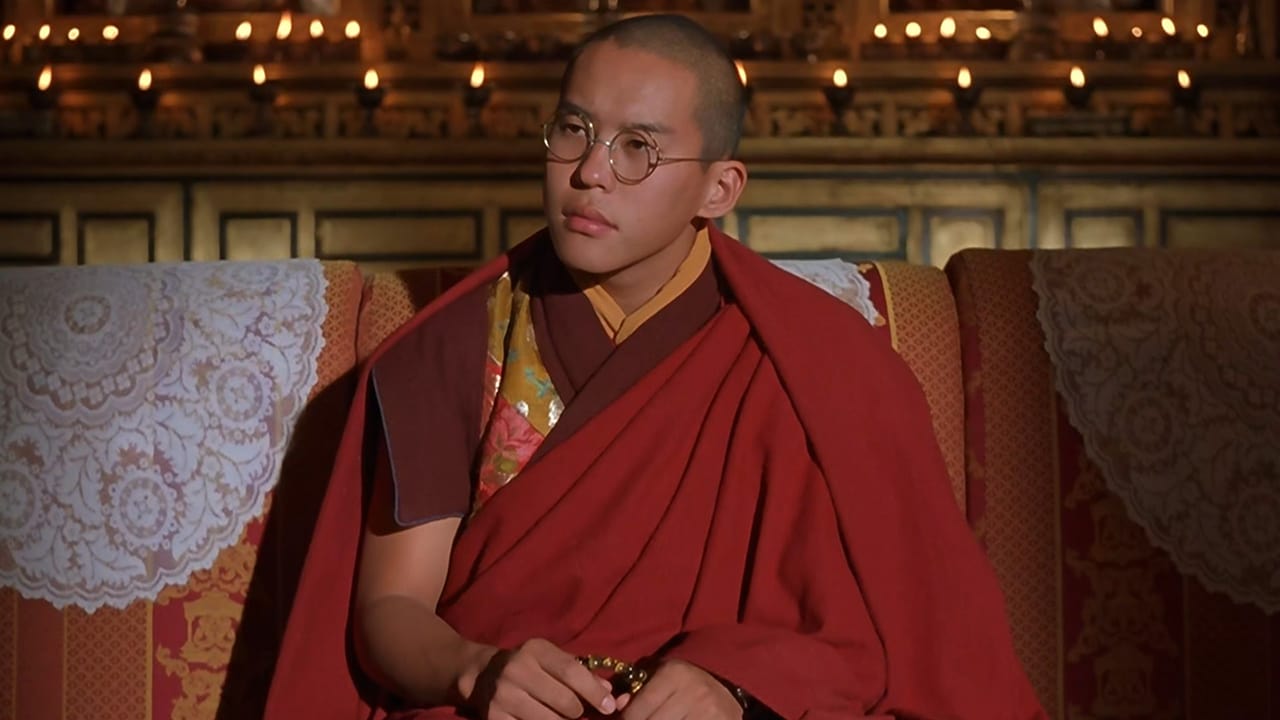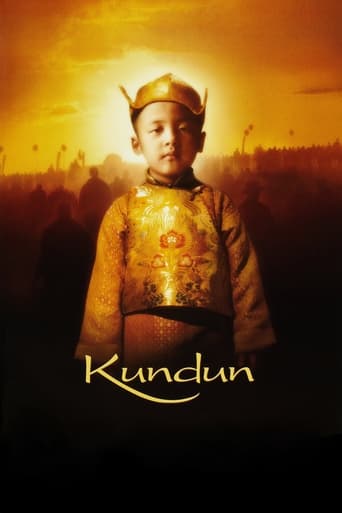

What makes it different from others?
... View MoreGood start, but then it gets ruined
... View MoreA movie that not only functions as a solid scarefest but a razor-sharp satire.
... View MoreIt's easily one of the freshest, sharpest and most enjoyable films of this year.
... View MoreI'm a Buddhist and absolutely adore the Dalai Lama. His kindness and compassion are simply breath-taking and I felt that from this film, which is undoubtedly beautiful, but a few parts irked me. For example, the constant referral of Buddhism as "a religion" (both verbally and implied), which felt very Western - as if people wouldn't understand that Buddhism is a way of life - a desire for enlightenment and attainment of peace, so it was Westernised into it being "a religion" as an easy explanation. As the 14th said himself, "My religion is very simple. My religion is kindness.". I think people get "spirituality" and "religion" mixed up way too easily - the whole Buddhist portrayal was actually rather shallow, which is deeply sad. I found the blaring music to be entirely over the top. It blares out, over and over, sounding as if it should be in a high-stakes action movie. It was loud - too loud, I thought, for a pretty gentle film.I didn't really enjoy the cinema of the film (I felt it was meant to be "art" more than anything) - I did enjoy the portrayal of the 14th, and it made me cry more than once. I read that a few people found it "passionless", which I didn't - he is a Buddhist monk - they are non-violent and seek to master their mind - of course there are going to be subdued reactions from himself and others. Another quote from the 14th, "When we meet real tragedy in life, we can react in two ways - either by losing hope and falling into self-destructive habits, or by using the challenge to find our inner strength." That said, the scenes in which he cries were incredibly powerful. So... I liked it and disliked it. It was emotionally powerful but not at all a good representation into Buddhism or even fact - there is more than one part that have been nay-said by not only the Lama himself, but also his mother, and by photographic evidence of the events in China.
... View MoreThe tale of the 14th Dalai Lama is very much like the story of the Last Emperor of China, Pu Yi. A boy handpicked to be a ruler of a country, grown up within confined solitude, kicked out of reign from Communist China, and then labeled as a criminal. The only real significance is that Pu Yi faced years in a concentration camp while the Dalai Lama managed to escape to India. That aside, it is not surprising to find in Scorsese's "Kundun" that he was heavily inspired by Bernardo Bertolucci's epic film "The Last Emperor". There were times when I was watching "Kundun" that I could not help wonder if this was an unofficial sequel. The costumes, techniques of candle lit lighting at night, story arc, and overall biography character-type was similar. I am not claiming Scorsese a copycat at all. It's just these two films are so alike. Just one happens to be about China's ruler and the other Tibet's. What worked so well for "The Last Emperor" is that despite its fancy set pieces and costumes, Bertolucci punched good in character drama and an overall intriguing plot. "Kundun" lacks both of these. Each scene in this movie drifts from one part of the Dalai Lama's life to another chronologically and in a sort of schizophrenic nature-the movie itself does not seem to know what it is really about. This is the biggest danger a filmmaker can fall into in making a bio-pic film, trying to cover too much ground without enough time nor interest to piece it all together. The acting suffers not from bad actors, but bad writing. Every moment is devoid of emotion, depicting every Tibetan character in a careless monotone. Then again, most characters are Buddhist monks and emotion is not their strong point. When I watch a movie, however, I expect to be engaged by an actor's talent. This magic is lost in this movie."Kundun" does succeed at least in the technical aspects. Roger Deakins cinematography is stunning to watch and almost pushes the barrier on what can be done with a camera, whether it be an elaborate steadi-cam shot or a detailed close-up. Philip Glass's score creates a sort of mood that hints to an ethereal supernaturalism, combined with a brooding choir, a lush percussion, and bombastic brass. It supports the visual images nicely. I admit that it seems to take over the movie to the point that there is no other sound present, especially with the horn blasts of flatulence caliber. The one factor that presented mild interest for me was how fair Scorsese treated the Tibetan culture. Little nuances like the funeral rites, the teachings of Buddha, and the Dalai Lama's philosophy are interesting. Yet great cinematography, a sublime soundtrack, and a good treatment of a lost culture cannot save a film. It is a bit disheartening since Scorsese has made some very good movies outside of the gangster genre (ex: Hugo, Shutter Island). While he kept his visuals and artsy elements at full throttle, all other elements are at a loss. This kind of movie is clearly not his cup of tea.
... View MoreThis is quite a long movie, as most historical type movies tend to be. Kundun clearly has meaning for the Darli Lama and I have watched this movie for first time thirteen years after its original release, a filler in summer 2010 when there are no more good movies to watch at the moment. Watched it with my 12 year old son who turned to the net afterwards to check information about the Dar ly Lama and Tibet and also the Chinese invasion of Tibet. It is a beautiful film and the story is well told, if a little slow and tedious at times. this is in a different category of film making for Martin Scorsese and this will for me stay in the memory. A film for all ages, nothing graphically or verbally uncomfortable about this movie, it does the job of entertaining me one Sunday afternoon!
... View MoreI excepted a lot from this movie, and it did deliver. There is some great Buddhist wisdom in this movie. The real Dalai Lama is a very interesting person, and I think there is a lot of wisdom in Buddhism. The music, of course, sounds like Koyanisquatsi because it is by Philip Glass. This adds to the beauty of the movie. Whereas other biographies of famous people tend to get very poor this movie always stays focused and gives a good and honest portrayal of the Dalai Lama. All things being equal, it is a great movie, and I really enjoyed it. It is not like Taxi Driver of course but as a biography of a famous person it is really a great film indeed.
... View More